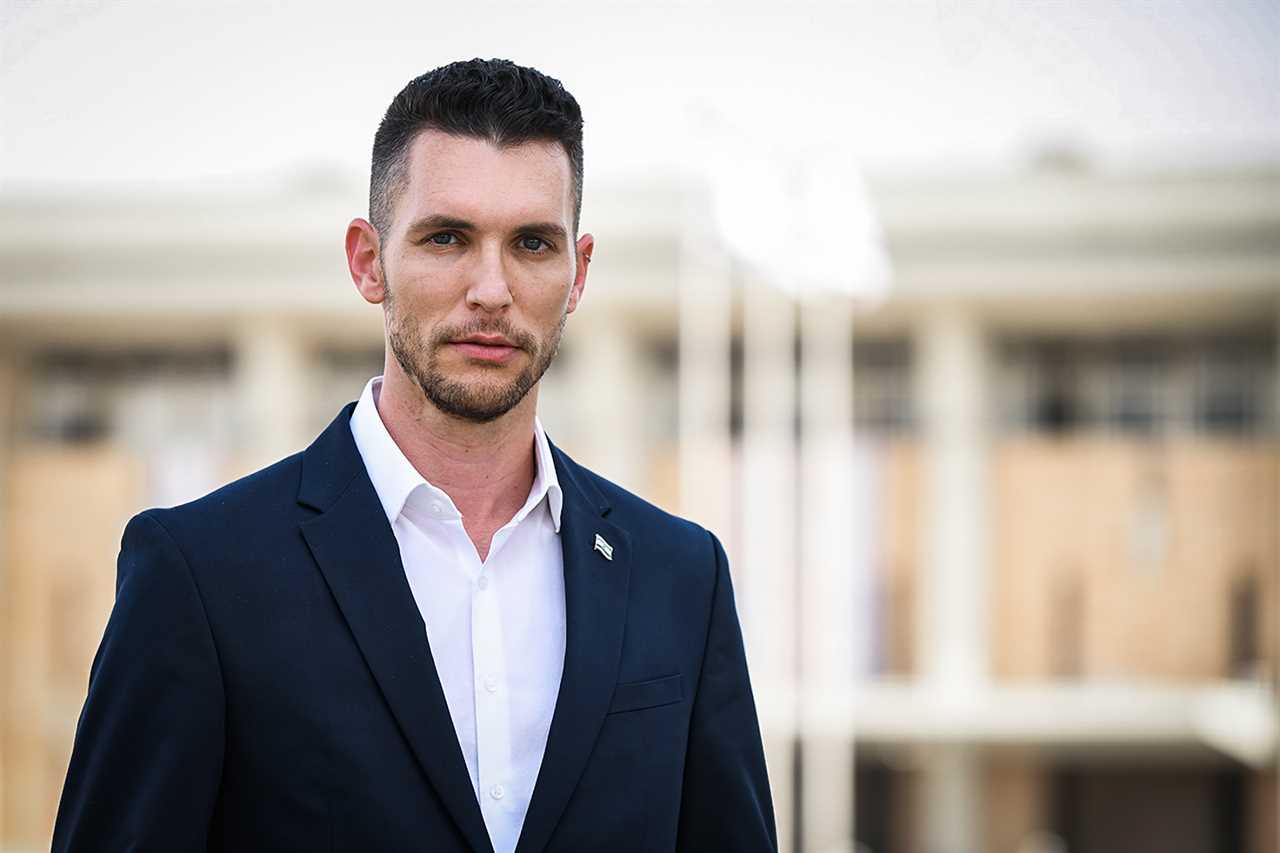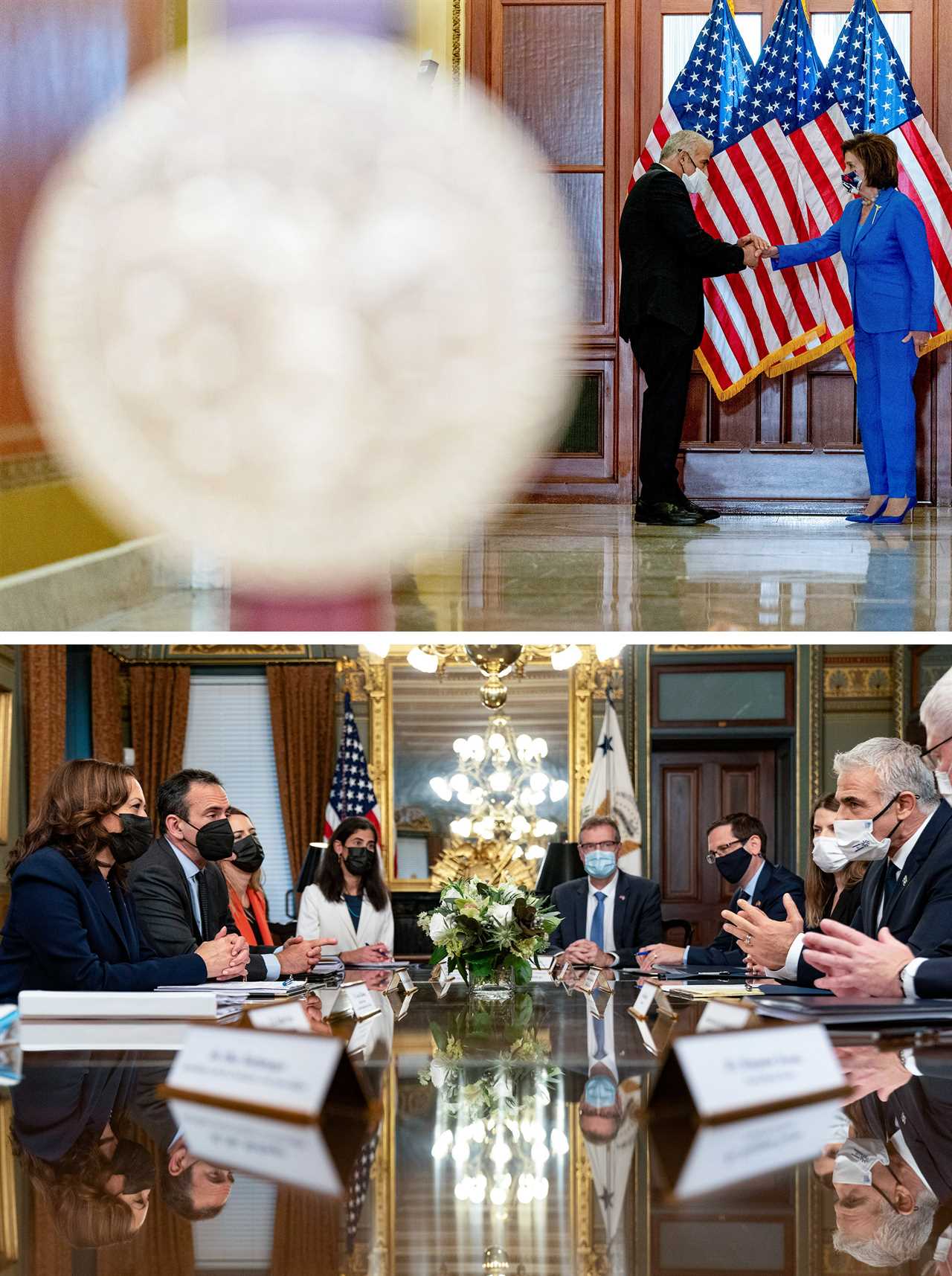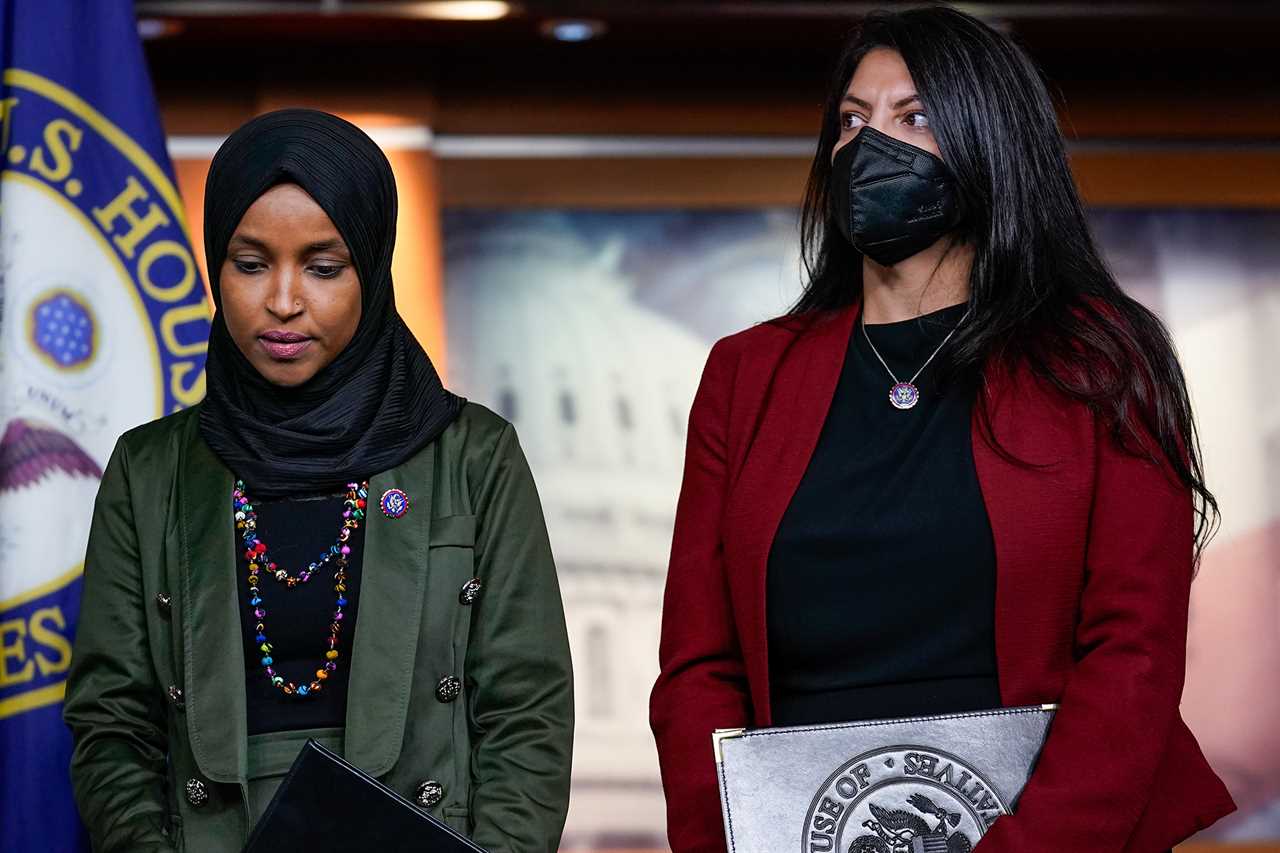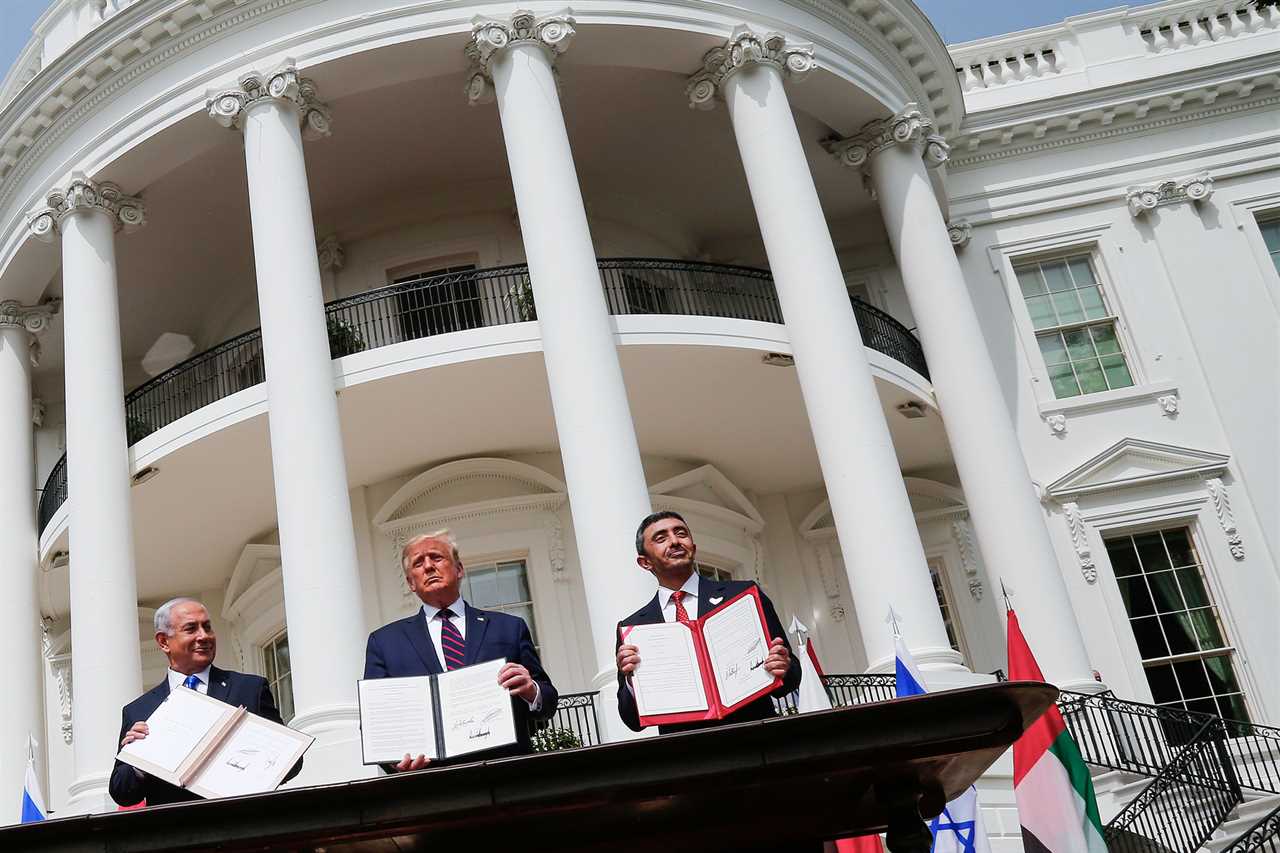
Last semester, GW For Israel, a Jewish student group at George Washington University, got a rare call from the Israeli embassy. Idan Roll, the country’s new deputy foreign minister, wanted to come to campus to speak. On a good night, the group’s events might draw a couple dozen students. But on a Tuesday in late November, more than 80 Jewish students, student council members and college Democrats and Republicans packed into the new Hillel building on campus, where Roll, 37, introduced himself as “Idan” and then held court at the podium.
Instead of reciting the typical fare about the security threats facing Israel, Roll talked about issues facing everyday Israelis — Covid lockdowns, economic pressures, the maddening bus schedules on Shabbat. He spoke openly about his two children, born via a surrogate in Oklahoma, with his husband, Harel Skaat — one of Israel’s biggest pop stars, who once finished second in the country’s version of “American Idol” and went on to compete in the Eurovision Song Contest. Roll shared the challenges of narrowing down the guest list for the wedding the couple held last year. He spoke about LGBTQ rights in Israel, anti-Semitism and how to be pro-Israel in liberal spaces — a message that seemed to resonate with the audience.
“It’s always about Israelis versus Palestinians, and it was great to set that aside and expose people to a different conversation about Israel,” said Jessica Carr, one of the students who organized the event.

Roll’s attempt to win over left-leaning students at GW was just one stop on a four-day goodwill tour designed to forge a fresh relationship with the new Democratic administration and others in Washington. The previous day, he had met with Deputy National Security Adviser Jon Finer and Deputy Secretary of State Wendy Sherman. Before the GW visit, Roll had lunch with Mark Mellman — president of the Democratic Majority for Israel and a pollster and strategist who has advised Roll’s boss, Foreign Minister Yair Lapid — and then schmoozed with reporters over drinks at the Ritz-Carlton. He also met with several Democratic lawmakers, ranging from Rep. Ritchie Torres (D-N.Y.), a rare defender of Israel among progressives, to Jewish lawmakers like Jerry Nadler (D-N.Y.) and Sen. Jon Ossoff (D-Ga.), to Sen. Chris Van Hollen (D-Md.), who has criticized Israel in the past.
After Benjamin Netanyahu’s divisive 12-year rule ended last June, Israel’s new coalition government wants to woo back the Democratic Party, particularly the progressives who have become more and more willing to openly question a staunch American ally. Roll — young, gay, handsome, charismatic — has quickly become the face of that effort. Lapid made his own visit to Washington a month earlier to meet with Secretary of State Antony Blinken and Senate and House leadership; Roll’s mission was public diplomacy — connecting with young lawmakers, Jewish groups and students, and even taking in a Washington Wizards game to support Israeli player Deni Avdija. It was an unusually high-profile visit for a deputy, who also happens to be the youngest member of Israel’s new government.
Roll’s challenge is steep. While the Republican Party grew more pro-Israel under President Donald Trump, polling shows that Democrats, particularly younger ones, have grown far more sympathetic to the Palestinians than they once were. Democratic officials have changed too, with progressives such as Reps. Rashida Tlaib and Ilhan Omar pushing to upend the party’s longstanding support for Israel, and other liberal lawmakers looking to condition U.S. aid on better treatment for the Palestinians. Trump heightened the tension by seizing on statements by Tlaib and Omar to paint Democrats as anti-Semitic and Jewish liberals as self-loathing. Meanwhile, Israel has gotten caught up in America’s reckoning over racial justice, with some progressives posting the hashtag #FreePalestine alongside #BlackLivesMatter and labeling Israel an “apartheid state.”
Roll is a member of Israel’s center-left Yesh Atid party, which supports a two-state solution. While he says he doesn’t want to shut down talk about the Israeli-Palestinian conflict, he is conspicuously working to convey the “diverse narrative of the Israeli story,” as he put it to me over coffee at the Riggs Hotel in Washington. For Roll, that means widening the conversation between the United States and Israel to include issues that liberals in both places can agree on: climate change, gay rights, economic opportunity. “As someone who got into politics to promote liberal values, I think there’s a bigger connection and similarity between liberal values in Israel and progressive ones in the United States than what meets the eye,” he says.
After Netanyahu alienated Jewish progressives, while embracing evangelical Christians as stronger allies of Israel, many Democratic leaders in Washington are eager for their party to reclaim the pro-Israel mantle in a post-Trump, post-Netanyahu era. House Speaker Nancy Pelosi is visiting Israel this week with a delegation of Democrats. “There is no question this new government has a new approach to not just Democrats and progressives, but also to the American Jewish community,” says Halie Soifer, CEO of the Jewish Democratic Council of America, who took part in a meeting between Roll and Jewish groups. “Everything about Idan represents something different than the last government.”
But among lawmakers and U.S. officials, Roll has gotten a more mixed reaction — a response that reveals just how divided Democrats, and the country as a whole, have become over Israel and raises questions about whether the trend can be reversed. While critics on Capitol Hill say they appreciate Israel’s social advances, they warn that no amount of gay pride, socialized medicine or solar energy can compensate for the country’s treatment of the Palestinians.

“The fact Tel Aviv has as raucous and joyful gay parade as New York or San Francisco is truly something to be celebrated,” says Rep. Andy Levin (D-Mich.), another member of Congress who met with Roll during his visit to Washington. “But human rights is not a menu or a smorgasbord where you get to choose a few things you like.”
Anyone expecting the new Israeli government to make progress toward ending the Israeli-Palestinian conflict will be disappointed. The coalition includes a motley assortment of parties from across the political spectrum — Roll compares it to Alexandria Ocasio-Cortez teaming up with Ted Cruz — who agreed on little else except the need to get rid of Netanyahu. To hold the fragile coalition together, the parties made a tacit agreement to avoid making any bold moves toward the Palestinians and instead focus on other issues.
Roll’s diplomacy on LGBTQ rights and other progressive priorities will be a test of whether that effort sticks, or whether progressives in the United States see it as merely a deflection strategy.
At GW, Roll told the students, “I’m not pink-washing anything by talking about who I am.” Still, he describes his country today as constantly trying to balance “the values on which we were born and the fact that we are in an ongoing struggle for national security,” as he put it to me. “It’s not a means of deflection. But we are a diverse coalition that has its limitations.”
Roll grew up in the tiny town of Mevaseret Zion, a suburb of Jerusalem that boasts the world’s first kosher McDonald’s. After completing his army service, he joined the reserves, where he founded a program to enlist orthodox Jews into the Intelligence Corps and teach them computer skills.
In his early 20s, he spent time in the United States, working as a counselor at a Kibbutz-style summer camp in Texas organized by an Israeli non-profit that promotes Jewish heritage around the world. Roll hadn’t come out as gay yet. “He was funny, cool and really engaging,” remembers Aya Margalit, his supervisor at the camp, who remains a friend of Roll’s. “The kids really related to him. But I could see he was struggling. … When you are all working and living together that closely, there are a lot of deep conversations, and it’s a different way of representing who you are.”

Roll came out publicly after meeting Skaat 11 years ago. At the time, Roll was working as a model and a cable TV host, and they formed a celebrity power couple. But they quickly settled into a quiet life in a residential neighborhood of Tel Aviv, and Roll left modeling to study law and work as an attorney in Israel’s tech sector.
It was his and Skaat’s decision to start a family that pushed Roll into politics. Surprised to find that it was illegal in Israel for gay men to adopt or have a child via surrogate, Roll founded an organization called Pride Front to encourage more LGBTQ Israelis to get involved in the country’s political process. In 2018, the group brought more than 80,000 people into the streets to protest the adoption and surrogacy law. Last July, after years of lobbying by the group, Israel’s Supreme Court ruled that same-sex couples can legally have a child via surrogate. (Same-sex marriage is still not legal in Israel, but since 2006 the country has recognized same-sex marriages performed abroad.)
The protests drew the attention of Lapid, the head of the Yesh Atid party. He called Roll into his office and told him his activism was impressive, but that getting into politics would enable him to make real change, Roll recalls. Then he asked, “Are you ready for the next step?”
“It struck me that I had to practice what I preach,” Roll said of his decision to enter politics. “I had to not only just encourage others to take political action and move forward, but I had to take the lead.”
Roll joined Yesh Atid and was elected into the Knesset in 2019, focusing on LGBTQ issues at first before venturing into tech and other policy areas. During the pandemic, he pushed for funding to help small businesses reopen. But he also drew public criticism — first, for challenging the Netanyahu government’s authority to impose a lockdown and, more recently, for being photographed unmasked at a New Year’s Eve party, after which Roll and his husband tested positive for the virus. (Roll said all attendees had been tested before the event.)
Still, colleagues call Roll a rising star who embodies his party’s DNA: moderate, inclusive and forward-looking. Some Israelis compare him to a modern-day Srulik, the iconic, mid-century Israeli cartoon of an aspirational, strong Israeli man. “He knows about the troubles of small business and those fighting for equal rights,” said Israel’s energy minister, Karine Elharrar, another member of Yesh Atid. “He hasn’t forgotten the challenges he faced or what rocketed him into politics.”
The new Israeli government has made shoring up relations with America a top priority. Lapid, the foreign minister, tapped Roll to be his deputy to reach out to younger American leaders and address what Lapid sees as a global delegitimization campaign against Israel playing out on social media and college campuses.
“There are many misconceptions about Israel,” Lapid said in an interview. “Some people do not accept us and are attempting to delegitimize our existence. Idan’s out-of-the-box and forward-thinking approach to challenges make him the perfect figure to tell Israel’s story to the world.”

In addition to his visit to Washington, Roll has been speaking regularly with young lawmakers on Capitol Hill and with Jewish leaders on an almost daily basis, making his case to the American left; he has done similar outreach in other countries as well. But when it comes to the conflict with the Palestinians, his word can only go so far. While Yesh Atid opposes any division of Jerusalem, which the Palestinians envision as their future capital, the party’s support for a two-state solution stands in contrast with the position of Israeli Prime Minister Naftali Bennett. A protégé of Netanyahu’s who campaigned as his right-wing alternative, Bennett has publicly stated his opposition to the creation of a Palestinian state.
At the same time, Bennett has committed to what he calls “shrinking” the longstanding conflict by helping to improve living conditions for Palestinians. Since taking office, the Israeli government has increased the number of work permits for Palestinians inside Israel, allowed the construction of thousands of Palestinian homes in West Bank areas under Israeli control and granted legal status to thousands of Palestinians.
“It is not the level that we would like, but for the first time in many years there is significant progress on a range of issues — from water to work permits — and we are seeing some improvements in the quality of life for Palestinians,” a senior State Department official told POLITICO.

While Democrats have long supported a two-state solution, the Biden administration, in a way, has pursued its own “shrinking” of the conflict. With President Joe Biden stating his desire for America to focus less on the Middle East and more on China, the two-state solution has been reduced to a talking point. Instead, U.S. officials now call for policies to ensure that Palestinians and Israelis experience “equal measures of freedom, security, opportunity and dignity,” as Blinken has put it.
This presents an opening for Roll. Yet progressive Democrats have become increasingly critical of Israel, and to many on the left, Roll’s diplomacy, while an improvement over the Netanyahu years, ultimately is only cosmetic. (This pushback is not just an American phenomenon: On a visit to Belgium on the way back from the United States, Roll canceled some meetings with Belgian officials after the left-leaning government passed a law requiring goods made in Israeli settlements to be labeled that way.)
“The question is: Toward what end?” asks Matt Duss, a foreign policy adviser to Sen. Bernie Sanders (I-Vt.), a longtime critic of Israel’s policies toward the Palestinians. “If we’re just trying to upgrade to a Premium Economy version of the occupation, that’s not going to work. We should try to improve Palestinian lives and defend their rights on a real and declared trajectory toward ending the occupation and replacing it with political equality.”
Yousef Munayyer, a Palestinian author and scholar at the Middle East Institute in Washington, points to a cultural and generational shift in which younger grassroot activists who are important to the Democratic Party are demanding policy with principle — for domestic as well as foreign policy. “Their formative experience when it comes to the U.S.-Israel relationship is fundamentally different from the generation that is going to shape the leadership of the party going forward,” Munayyer says of Democrats’ older generation.
“It’s hard for a Democrat to be supporting voting rights at home but overlook the fact that Palestinians under Israeli occupation have no right to vote for the government ruling over there. Those things just can’t fly anymore,” agreed one congressional staffer who traveled to Israel and the West Bank in November with a bipartisan delegation of lawmakers. Sen. Chris Coons (D-Del.), who led the delegation, told POLITICO in a statement that bipartisan support for Israel in Congress remains strong, but that he is “concerned about how the bipartisan consensus [in the United States] and support across the Israeli political spectrum for the two-state solution has eroded.”

Even as Tlaib and Omar have called for a halt to American military aid to Israel, other progressives take more nuanced positions. Sanders and Sen. Elizabeth Warren (D-Mass.) support providing security assistance to Israel, including $1 billion in new U.S. funding for the Iron Dome missile defense system, while still being far more critical of Israel than Biden or Senate Majority Leader Chuck Schumer.
Levin, the Michigan congressman, is trying to move his colleagues to what he calls a “new center of gravity” that both reaffirms the U.S. commitment to Israel’s security and seeks to end the occupation of the West Bank. He has authored legislation that would restrict how Israel spends U.S. military aid, so it won’t be used to uphold the occupation.
“The world is changing. Congress is changing. And I am determined and happy to occupy this very uncomfortable position,” said Levin, whose father and uncle, Sander Levin and Carl Levin, served for decades in Congress and were both staunch supporters of Israel. “Maybe the proudest part of my family’s Jewish tradition is that we stand up for what we think is right. It’s more important than any political career.”
Roll says he isn’t running from tough conversations with lawmakers like Levin, who told me he found Roll “impressive” in their meeting. “It’s not about coming here to win an argument. It’s about creating a dialogue,” Roll says.
For him, emphasizing Israel’s social advances doesn’t negate the fact that the current government needs to address the conflict with the Palestinians. But if Americans better understood the complex mosaic of Israeli society, he says, perhaps they could help encourage the Israeli government to keep making changes.
“What I’m at times troubled by is the fact that everything has become so binary. And I think that binary concepts are not good concepts in politics, or in life,” he says. “We live in gray areas. Our lives as individuals and societies are complex.”
To that end, Roll is working with Lapid on getting additional countries to sign on to the Abraham Accords — a set of peace agreements between Israel and several Arab states signed during the Trump years — and is promoting Israel’s tech sector with a global program that trains citizens across the world for high-tech careers. Roll believes efforts like these will earn Israel more good will than any political message. He also is expecting to return to the United States this spring to visit not just Washington but New York and the West Coast, where he hopes to connect with progressive communities. In the future, he wants to travel to cities like Chicago, and Austin, Texas, which top Israeli officials have not visited in years.

Roll says he sees a lot of parallels between the polarization in the United States and in Israel during the Netanyahu years. But while Israel’s political parties banded together to end the country’s political paralysis, America’s leaders have failed to unite the country in the post-Trump era. He nonetheless has hope that American support for Israel can become a bipartisan issue again. He recalled a recent trip to the United Arab Emirates, one of the first countries to sign onto the Abraham Accords, which reminded him “it’s possible to change a historical narrative” and gave him hope for the future, including with the Palestinians.
“It’s not just about solving the conflict — it’s about showing our people that we can find a way to work together and live side by side,” he said. “But it will take time.”
----------------------------------------
By: Elise Labott
Title: A Millennial Politician Wants to Rebrand Israel. Not All Democrats Are Buying It.
Sourced From: www.politico.com/news/magazine/2022/02/16/idan-roll-israel-foreign-policy-00008916
Published Date: Wed, 16 Feb 2022 04:30:00 EST






